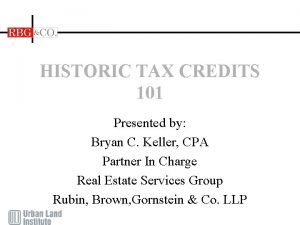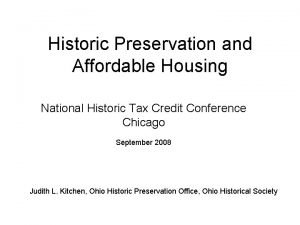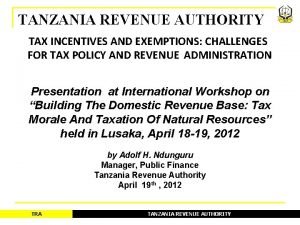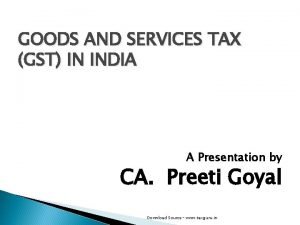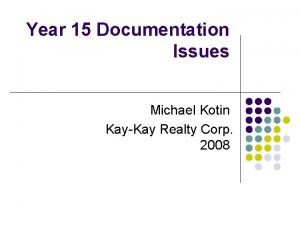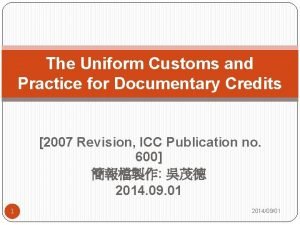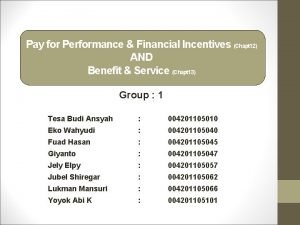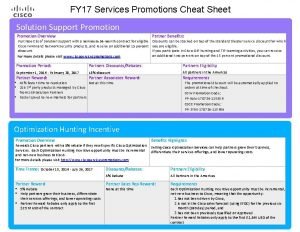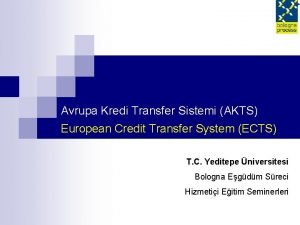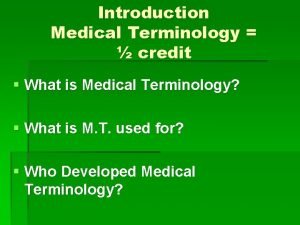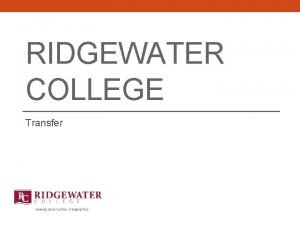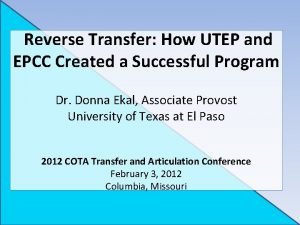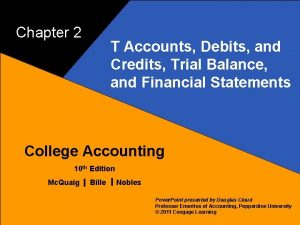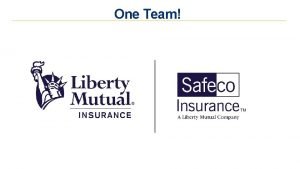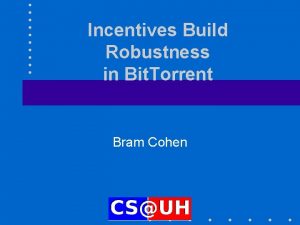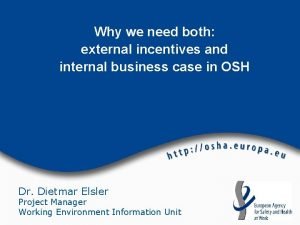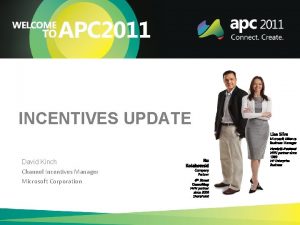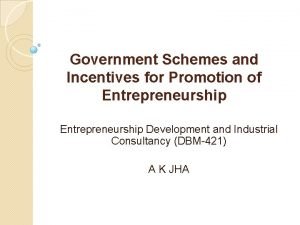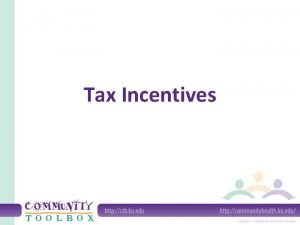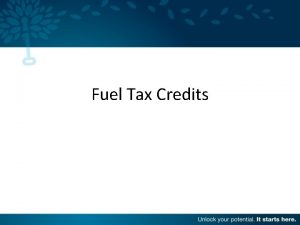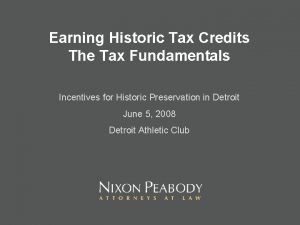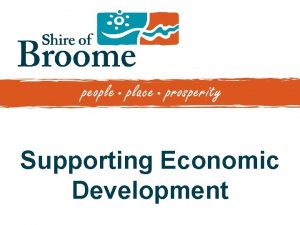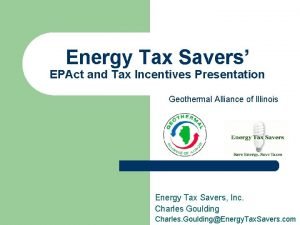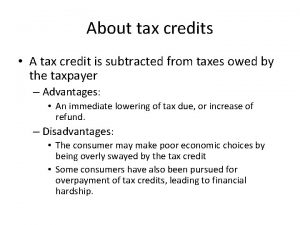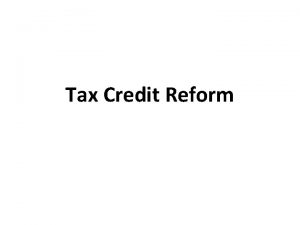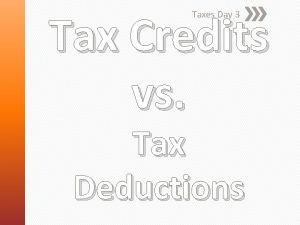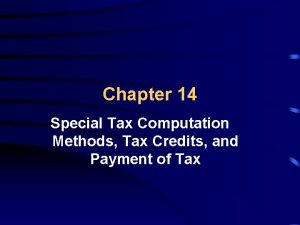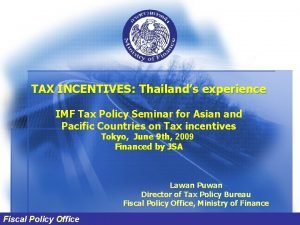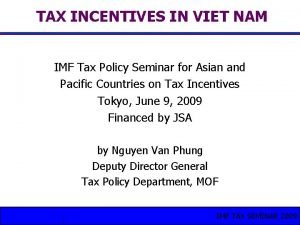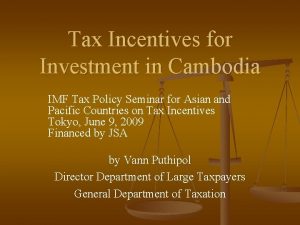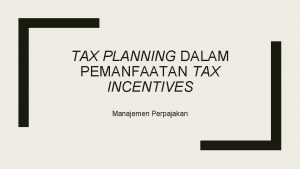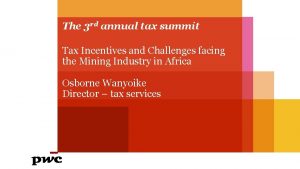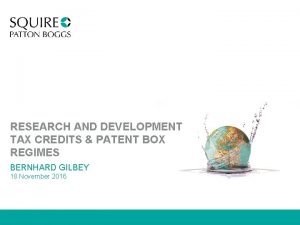Tax Credits Incentives and Economic Development July 11
























































- Slides: 56

Tax Credits, Incentives, and Economic Development July 11, 2013 Presented at M & J University Lake Lanier Islands, Georgia by Peter Floyd Michael Giovannini Alston & Bird LLP Atlanta, GA

Who We Are § § § Atlanta Headquarters with 800+ attorneys Offices in CA, D. C. , NC, NY, TX Attorneys ranked among the best in the U. S. and the world Strong practices in infrastructure and energy development, including government and economic incentives Public and private finance International construction & government contracts practice § Tax Expertise (Intl. , Fed. , State & Local) § Represent: Ga. state and local governments, public and private owners, accounting firms, engineering and design firms, contractors and subcontractors. Extensive Experience with: public finance, commercial construction, tax, grants and incentives, energy regulation, hospital-medical office building projects, college and university projects, retail and hospitality projects, sporting venues, industrial plants and facilities. §

Michael Giovannini’s Practice Member of Alston & Bird’s State and Local Tax practice group and Unclaimed Property team. Represents clients in disputes with state agencies, under audit, and in a planning/advisory capacity. My areas of expertise: § § § Multistate sales and use tax; Unclaimed property; Economic development. Disclaimer – Nothing in this presentation should be interpreted as the formal position of A&B or any of its clients Disclaimer – Very high level summary and not intended as legal advice re: a particular project

Overview § Overview of State Tax Credits § State-Specific Tax Credits – Georgia, Florida, Tennessee § Federal Tax Credits § Government and Economic Incentives

Purpose of State Tax Credits § Entice business to the state § Targeted businesses, e. g. film production, life sciences, manufacturing § Encourage additional investment in the state § Targeted industries, e. g. green energy § Reward job creation/retention in the state § Localities may also incent through credits or incentives available within a state’s development zone

Types of Credits § Statutory Tax Credits § Jobs Tax Credits § Many variations throughout states, generally maintain new, quality full-time jobs § Credit is per job and often over a several year period § May be tied to other factors to obtain greater and more desired impact § § Location (benefits can vary by tier) Type of job (generally full-time, permanent, state residents) High wage jobs Job retention § May be capped or allowed against withholding or sales/use tax § Credits with other names may really be jobs tax credits, e. g. headquarters credits

Types of Credits § Statutory Credits (cont’d) § Capital Investment Credits § Focus is on the amount of qualifying investment, either capital, jobs or both § Credit is measured by percentage of investment § Research & Development Credits § Ports Credits § Targeted Credits § Film § Green/renewable energy § § § Building envelope/ LEED Hybrid vehicles Products – energy star Recycling Telecommuting/transportation § Low income housing § Life Sciences § High Tech

Types of Credits § Statutory Credits (cont’d) § Credits based on other taxes paid § Inventory tax credits – LA, MS § Property tax paid – CT

Types of Credits § Negotiated Credits and Incentives § Quasi-Negotiated Credits and Incentives

Identifying State Tax Credits § Resources § Green incentives and renewable energy credits § http: //www. dsireusa. org § Commercial on-line databases § Publications § State websites § Departments of revenue § Departments of economic development § Other state-sponsored websites (e. g. , www. georgia. org; www. eflorida. com, www. openecd. tn. gov)

Identifying State Tax Credits § Understand the parameters of the credits and whether you qualify § Statutes, regulations, rulings, case law § How are key terms defined in the statute or contract? Read the small print. § How is full-time defined? § How are wages defined? § Are your employees employed by the entity making the investment? Does it matter? Sometimes it does § Are you leasing employees or using temps? Do they count? § Are home-based jobs included? § Don’t over commit to investment and jobs. § Tax credits are audited as part of the corporate income tax audit. § DOR will hold you to statutory/regulatory rules generally regardless of what the Department of Commerce promised.

Identifying State Tax Credits § Understand the parameters of the credits and whether you qualify (cont’d) § Contact local authorities § Local economic development, chamber of commerce, department of community affairs, state tax commissioner § Initial conversations can be anonymous § Determine the role each local agency plays in the process § Make sure that the effort is coordinated among the departments

Obtaining Credits and Incentives § Leverage interest in or from other states or localities to obtain the best benefit § Document the benefits you will receive or seek written guidance from the governing authority if necessary § Confirm these numbers. Based on your tax situation and legal entity structure, you may not reap full benefits. § Determine timelines, application deadlines, filing deadlines, required documentation § Determine whether credits will be bought or sold § Understand the clawback provisions

Obtaining Credits and Incentives § Outline the requirements in a spreadsheet or checklist and attach the timing references; determine action items § Assemble the team of persons responsible for these action items or oversight of the requirements § Teams may be small for some credits § Others may require larger teams with personnel from tax, accounting, legal, HR, public relations and operations

Obtaining Credits and Incentives § Things to keep in mind: § Some statutory credits require pre-approval, preauthorization, or some form of letter of intent prior to the start of the project. § Public announcements need to be timed. § Purchase of land, construction materials, equipment, entering into contracts need to be timed. § Understand the value of the tax credit package § § Are you in NOLs? What is the carry forward period? Can the credits be sold or assigned? Tax credits can be limited by apportionment formulas. § Confidentiality § Some states disclose information publicly regarding taxpayers who receive tax credits.

Maintaining Credits and Incentives § Many credits and incentives have commitments to be tracked or reporting that must be made § Assign responsibility and accountability for compliance § Create a compliance calendar, set up reminders, put quality review in place § Track job creation and investment commitments regularly, if you will not meet these, renegotiation may be necessary § Reporting and compliance can be required for 20 or more years depending on the program.

Maintaining Credits and Incentives § Establish regular meetings of the team to review requirements and deadlines § Make sure the right hand knows what the left hand is doing § Maintain required supporting documentation § For filings, audits, transfers § Plan/negotiate for contingencies (exit strategy) § Claw-backs and recaptures § Acquisition or restructuring

Common Pitfalls § Over-commitment § Confidentiality/Publicity Concerns § What is the Package Really Worth? § Selecting a Consultant § Responsibility for Compliance § Data Issue and Interdepartmental Cooperation

Overview § Overview of State Tax Credits § State-Specific Tax Credits – Georgia, Florida, Tennessee § Federal Tax Credits § Government and Economic Incentives

Georgia-Specific Credits § Jobs tax credit § Quality jobs tax credit § Mega project tax credit § Investment tax credit § Research and development tax credit § Retraining tax credit § Film tax credit

Georgia-Specific Credits § Jobs tax credit (OCGA § 48 -7 -40) § Available in amount up to $4, 000 per new job to businesses in certain sectors, such as manufacturing, telecommunications, broadcasting, tourism, and research and development (but not retail) § Jobs must be new, full-time, and pay at or above average § Amount based on which “tier” the business is located; tiers are based on relative economic prosperity § The lower the tier, the more credit is available (and the less jobs are required to earn the credit) § New job threshold must be maintained in order to receive credit in a year § Tier 1 and 2 – 100% of a taxpayer’s liability; other tiers are 50% § Credit is available for 5 years, with 10 -year carryforward § Excess credit may be used to offset withholding tax

Georgia-Specific Credits § Quality jobs tax credit (OCGA § 48 -7 -40. 17) § Must create at least 50 jobs in the company’s first 12 -month period of Georgia employment § Jobs must pay wages that are at least 10% higher than the county average for wages § Credit ranges from $2, 500 per job to $5, 000 depending on how much wages are higher than county average (e. g. , $5, 000 if 200% more) § New job threshold must be maintained to receive credit in a year § Credit is available for 5 years, with 10 -year carryforward § Excess credit may be used to offset withholding tax § Note: cannot obtain both jobs tax credit and quality jobs tax credit for same job

Georgia-Specific Credits § Mega project tax credit (OCGA § 48 -7 -40. 24) § Available to companies that employ a minimum of 1, 800 net new employees; and § Have either a minimum annual payroll of $150 million or make a minimum $450 million investment in Georgia § Credit is equal to $5, 250 per job per year for the first five years of each net new job position § Excess credit may be carried forward for 10 years § Can also use excess credit to offset withholding tax liability

Georgia-Specific Credits § Investment tax credit (OCGA § 48 -7 -40. 30) § Provides a credit for 35% of the amount invested in a “qualified business” in the 2011 -2015 calendar years § A “qualified business” is one that registers as such, and: § Is located in Georgia; § Was organized no more than 3 years prior to the year in which the investment was made; § Has a headquarters in the state, which it maintained; § Employs 20 or fewer people in Georgia at the time of registration; § Had $500, 000 or less in gross annual revenue in any year prior to registration; § Has not obtained more than $1 million in gross cash proceeds from the issuance of equity or debt; § Has not utilized the film tax credit; § Is primarily engaged in manufacturing, processing, online and digital warehousing, online and digital wholesaling, software development, information technology services, research and development, or in an industry that is NOT retail sales, professional/financial services, etc.

Georgia-Specific Credits § Research and development tax credit (OCGA § 48 -740. 12) § Allows a credit equal for research expenses incurred in Georgia in a year § The amount is 10% of the excess of such expenses over a “base amount” § The company must have received the federal research and development credit in the year § Amount of credit may not exceed 50% of the company’s tax liability for the year; excess amounts may be carried forward § Beginning for credits created in 2012, excess may be applied against withholding tax liability

Georgia-Specific Credits § Retraining tax credit (OCGA § 48 -7 -40. 5) § Businesses can receive a tax credit of 50% of their direct retraining expenses, up to $500 per full-time employee, per retraining program. § Retraining program must be approved by Technical College of Georgia § $1, 250 per employee is the annual maximum § Eligible expenses include: § costs of instructors and teaching materials § employee wages during retraining § reasonable travel expenses § Can be used to offset up to 50% of a company’s Georgia corporate income tax liability § Excess credit can be carried forward for up to 10 years

Georgia-Specific Credits § Film tax credit (OCGA § 48 -7 -40. 26) § Provides 20% credit for companies that incur $500, 000 or more in production and post-production expenditures in Georgia, either in a single production or on multiple projects § An additional 10% credit is granted if the finished project includes a promotional logo provided by the state, or if the project promotes Georgia in some substantive way § The maximum amount is $5 million for a company § Applies not just to film, but also to video and other digital projects, including TV shows, movies, commercials, music videos, and interactive entertainment § A company can transfer or sell its film credits once per year § Excess credit can be carried forward for 5 years, or can be used against withholding

Florida-Specific Credits § Enterprise Zone Jobs/Property Tax Credit § Rural Job Tax Credit § Urban High-Crime Area Job Tax Credit § Entertainment Industry Tax Credit § Capital Investment Tax Credit § Community Contribution Tax Credit § Contaminated Site Rehabilitation Tax Credit § Hazardous Waste Facility Tax Credit § Qualified Target Industry Tax Refund incentive

Tennessee-Specific Credits § Jobs Tax Credit § Rural Opportunity Initiative Enhanced Job Tax Credit § Jobs Tax Super Credit § Integrated Supplier and Integrated Customer Tax Credit § Industrial Machinery Tax Credit § Headquarters Tax Credit § Sales and Use Tax Credit for Qualified Facility to Support an Emerging Industry § Data Center Tax Credit

Overview § Overview of State Tax Credits § State-Specific Tax Credits – Georgia, Florida, Tennessee § Federal Tax Credits § Government and Economic Incentives

Federal Tax Credits § Work Opportunity Tax Credits § Awarded to companies that hire individuals who have consistently faced significant barriers to employment § Range between $1, 200 and $9, 000 per new hire, depending on the specific group being targeted (e. g. , veterans, recipients of social security income, etc. ) § Qualifying Advanced Energy Project Credit § Available to businesses which establish, expand or re-equip a manufacturing facility for the production of energy efficient technology/property (e. g. , building a factory to manufacture solar panels) § Credit is 30% of investment

Federal Tax Credits § Manufacturers' Energy Efficient Appliance Credit § May be claimed on each qualifying energy efficient appliance produced by the company § The amount of the credit is based on the type of appliance, its energy efficiency, and for dishwashers and clothes washers, the amount of water it consumes (up to $225 per appliance) § A company can claim a maximum of $25 million in a year or 4% of gross receipts § Research Credit § Generally, a credit is available for 20% of a taxpayer’s research expenses over a base amount (similar to Georgia) § Unused research credit can be carried back 1 year and forward 20 years § The credit for any taxable year cannot exceed the excess of the taxpayer’s net income tax over the greater of (A) the tentative minimum tax for the taxable year, or (B) 25% of so much of the taxpayer’s net regular tax liability as exceeds $25, 000 § Also available for amounts paid by a company to an energy research consortium for energy research

Federal Tax Credits § Plug-In Electric Drive Vehicle Credit § A credit is available for qualified plug-in electric drive motor vehicles including passenger vehicles and light trucks § For vehicles acquired after December 31, 2009, the credit is equal to $2, 500 plus, for a vehicle which draws propulsion energy from a battery with at least 5 kilowatt hours of capacity, $417, plus an additional $417 for each kilowatt hour of battery capacity in excess of 5 kilowatt hours (the total amount of the credit allowed for a vehicle is limited to $7, 500) § Must be acquired for use or lease and not resale § Note: the credit phases out for a manufacturer’s vehicles over the 1 -year period beginning with the second calendar quarter after the calendar quarter in which at least 200, 000 qualifying vehicles manufactured by that manufacturer have been sold for use in the U. S.

Peter Floyd’s Practice Leader of A&B’s Government and Economic Incentives Team and is counsel to Location Georgia (a nonprofit providing economic and commercial development services to local governments), local governments and private incentive seekers Also, represents (a) Electric Cities of Georgia, MEAG Power, the Municipal Gas Authority of Georgia, Public Gas Partners, a nonprofit with government members in AL, GA, SC, TN, FL and a number of other local government utilities (electric/ gas/water/telecom) providers and related entities in Georgia and (b) private entities in public private partnerships and utility customers (e. g. , customers of Georgia Power or EMCs) and traditional and renewable independent power providers (IPP) in Georgia and nationally My areas of expertize: § § § Economic Incentives; Energy and Utilities (transactions and regulatory (Ga. PSC)); and Public Finance Disclaimer – Nothing in this presentation should be interpreted as the formal position of A&B or any of its clients Disclaimer – Very high level summary and not intended as legal advice re: a particular project

Overview § Overview of State Tax Credits § State-Specific Tax Credits – Georgia, Florida, Tennessee § Federal Tax Credits § Government and Economic Incentives

Purpose of Government & Economic Incentives § To encourage economic development and employment, most governments (federal, state and local) and some private entities (e. g. , utility providers) offer employers and project developers various types of incentives to locate or expand operations within their respective jurisdictions. § Parties: § (a) businesses seeking incentive packages; § (b) governments and utilities offering such packages; and § (c) consultants, lenders, investors or other parties

Types of Government & Economic Incentives § Most incentives fall into the two categories: § Statutory incentives § Negotiated incentives.

Types of Government & Economic Incentives Statutory incentives Incentives that—by law—a party is entitled to if they qualify and follow the correct rules and procedures. We frequently advise clients regarding what statutory incentives are available and how to qualify for and receive tax incentives (credits and exemptions), applicable grants and incentivized financing. Examples § § Tax Credits Some Grants Job assistance programs Permitting

Types of Government & Economic Incentives Negotiated Incentives Most governments (particularly state and local) and utilities have the limited power to negotiate incentive packages (both monetary- and infrastructure-based), the various forms of which and limitations related thereto differ by location.

Types of Government & Economic Incentives Frequently negotiated incentives include: § property tax reductions § transactional tax abatements § energy/utility rate and fee waivers or reductions § state or local grants § “Quick Start” job training program

Types of Government & Economic Incentives Frequently negotiated incentives include (cont. ): § site acquisition/improvement incentives § road, utility and other infrastructure construction/improvement § tax-exempt bond financing for manufacturing projects § public-private partnerships (PPP) § tax increment financing/community improvement districts

Types of Government & Economic Incentives Negotiated Incentives Careful consideration must be given to the incentives sought or offered, as effecting some incentives requires legal structures or elections that preclude or severely limit the ability to receive or offer other incentives and may make future financing arrangements and ongoing operations more complicated.

Identifying Government & Economic Incentives § Resources § State Websites § Departments of revenue § Departments of economic development § Other state-sponsored websites (e. g. , www. georgia. org) § Local Government Websites § Chamber and Development Authority Websites § Utility Websites § Note: in my experience, none are comprehensive

Implementing Incentives § Good understanding of industry, infrastructure and operational needs of incentivized activity § Many complex considerations in site selection, e. g. , labor, infrastructure (transportation, data, energy, commodity, permitting and incentives) § Leverage interest in or from other states or localities to obtain the best benefit § Understand the clawback provisions and long term potential issues with operations and financing

Government and Economic Incentives § Who are the other players? § State Officials: § § § Department of Economic Development Department of Industry, Trade and Tourism Department of Revenue Department of Community Affairs Department of Technical and Adult Education § Local Officials § Chamber of Commerce § Industrial Development Authority § Tax Assessors § Utility Providers

Government and Economic Incentives § Why do state and local governments want to play? § § Expansion of Tax Base Increase/Retain Employment New Development Multiplier Effect Political/Cultural Support § Why do utilities want to play? § Large energy and water users provide a steading base of sale § Potential for unique transactions that help utility operations § Time of use § Interruptible service

Government and Economic Incentives § Property Tax Reduction Bonds § Direct Tax Reduction Agreements § Prohibited Indirect Approach Required § Bifurcation of Property Interests/Use of Local Development Authorities § “Fee” or “Remainder” Interest vs. Leasehold Interest § “Reasonable Basis” Standard – § Wide Variance among Local Governments § Project type may dictate desirability of offering incentive (solar/depreciation example)

Government and Economic Incentives § Property Tax Reduction Bonds (cont’d) § Leasehold Valuation Agreement (“LVA”) § LVA vs. PILOT § Enforceability Issue § Phantom Bonds or Bonds for Title

Government and Economic Incentives Industrial Development Authority Bond Purchase Agreement Bond Security Agreement(s)* Tru Se st cur Ind ity ent Ag ure ree me nt( s)* Lease & Purchase Option Lease Payments Private Company Construction Cost Reimbursements LEGEND: Denotes Agreement Denotes Payment(s) Denotes Pledge * Denotes Optional Assignment or Transfer Bond Purchase Payments Debt Service Payments Trustee/ Paying Agent

Government and Economic Incentives § How to get your client in the game § § Identify Developer Clients New Construction/Expansion Projects Clients Relocating Headquarters Clients in Favored Businesses: § § § Manufacturing/Distribution High Technology Communication Research and Development Back Office Services (call centers, customer service, sales, etc. )

Government and Economic Incentives § How to get your client in the game (cont’d) § Clients that May Use Tax-Exempt Debt § Small Manufacturing Facilities § Multifamily Housing § Gas/Electric/Water Companies § Solid Waste Disposal § Airports/Docks/Wharves

Government and Economic Incentives § How to get your client in the game (cont’d) § Clients that are particularly attractive to utilities § Large loads § Facilities that are the first in a growth target territory § Flexible usage § Steady load § Large employers

Government and Economic Incentives Take aways § Be proactive and comprehensive § Have a multidisciplinary team § Think long term

A&B Resources § Advisories § Economic Development Advisory: Several Economic Development Bills Pass as the Georgia General Assembly Wraps Up Its 2013 Regular Session – April 8, 2013 § Economic Development Advisory: Georgia General Assembly Passes Economic Development-Friendly Bills During 2012 Session – April 10, 2012 § Energy & Sustainability Advisory: Energy Efficiency and Conservation – Successful Legislative Session in Georgia – Nov. 10, 2010 § Public Finance Advisory: Certain Governmental Issuer’s Tax. Exempt Bonds Questioned by IRS Regarding Post-Issuance Tax Compliance – Jan. 30, 2009 § A&B’s Tax Blog: http: //www. alston. com/taxblog/ § Government and Economic Incentives Blog: coming soon

A&B Resources § Other presentations and events § Alternative-Fueled Vehicle Roadshow on Transportation and Clean Fuels – Georgia Local Government Financing Options - June 3 -21, 2013 § Natural Gas Vehicle Fleet & Infrastructure Summit – Utility Perspective- June 6, 2013 § 2013 City Attorneys § CLE Seminar & Annual Business Meeting – Energy and Operational Savings Finance Opportunities - June 23, 2013 § APPA Legal Seminar – Model Municipal Service Terms and Charter Provisions October 21, 2013 § Solar Programs in Georgia and Proposed Amendments to the Georgia Cogeneration and Distributed Generation Act and Electric Territorial Act - March 18, 2013 § Finance 101 Forum for Utility Managers - May 2, 2012 § GAWP Workshop – Energy and Operational Savings Finance Opportunities – July 30, 2013

Questions? Peter K. Floyd, Esq. Phone: 404 -881 -4510 E-mail: peter. floyd@alston. com Bio: http: //www. alston. com/professionals/peter-floyd/ Michael M. Giovannini, Esq. Phone: 404 -881 -7957 E-mail: michael. giovannini@alston. com Bio: http: //www. alston. com/professionals/michaelgiovannini/ Alston & Bird LLP www. alston. com Atlanta • Charlotte • Dallas • Los Angeles • New York • Research Triangle • Silicon Valley • Ventura County • Washington, D. C.
 New market tax credits 101
New market tax credits 101 Historic tax credits 101
Historic tax credits 101 New market tax credits st louis
New market tax credits st louis New market tax credits 101
New market tax credits 101 Historic tax credits 101
Historic tax credits 101 Historic tax credits 101
Historic tax credits 101 Tax incentives in tanzania
Tax incentives in tanzania Economic growth vs economic development
Economic growth vs economic development Economic growth vs economic development
Economic growth vs economic development Conclusion on gst
Conclusion on gst Roland purcell a technical writer
Roland purcell a technical writer “don’t let the tax tail wag the economic dog”
“don’t let the tax tail wag the economic dog” The uniform customs and practice for documentary credits
The uniform customs and practice for documentary credits Debits and credits t chart
Debits and credits t chart Debits and credits cheat sheet
Debits and credits cheat sheet Financial incentives adalah
Financial incentives adalah Meetings incentives conventions and exhibitions (mice)
Meetings incentives conventions and exhibitions (mice) Cisco promotions 2018
Cisco promotions 2018 January february march april may june july august
January february march april may june july august Chapter 1 lesson 2 our economic choices worksheet answers
Chapter 1 lesson 2 our economic choices worksheet answers Georgijev financial group
Georgijev financial group Transfer to vcu
Transfer to vcu Ects grade
Ects grade Avrupa kredi transfer sistemi nedir
Avrupa kredi transfer sistemi nedir Uncc transfer credits
Uncc transfer credits Credits medical definition
Credits medical definition Scu transfer credits
Scu transfer credits Epcc degree plans
Epcc degree plans Nsqf credits
Nsqf credits Episd graduation requirements
Episd graduation requirements Edward scissorhands opening scene
Edward scissorhands opening scene Tufts academic probation
Tufts academic probation Walking dead opening credits
Walking dead opening credits T-accounts debits & credits simulation
T-accounts debits & credits simulation Jamestown clipart
Jamestown clipart Imagine there is a bank account that credits you
Imagine there is a bank account that credits you Hpe knowledge credits
Hpe knowledge credits Mobility credits
Mobility credits Type of sales promotion
Type of sales promotion Fiscal incentives for industrial promotion (revised)-2013
Fiscal incentives for industrial promotion (revised)-2013 Work incentives network oregon
Work incentives network oregon Instant incentives liberty mutual
Instant incentives liberty mutual Dell emc services
Dell emc services Trade incentives
Trade incentives Partner incentive program microsoft
Partner incentive program microsoft Bram build
Bram build Incentives build robustness in bittorrent
Incentives build robustness in bittorrent Office 365 incentives
Office 365 incentives Solidary incentives definition ap gov
Solidary incentives definition ap gov External incentives
External incentives Online servives
Online servives Microsoft azure channel incentive
Microsoft azure channel incentive Microsoft managed reseller incentive
Microsoft managed reseller incentive Csp indirect reseller incentives
Csp indirect reseller incentives Trade incentives examples
Trade incentives examples Offering incentives for charitable acts essay
Offering incentives for charitable acts essay Government incentives for entrepreneurship
Government incentives for entrepreneurship

